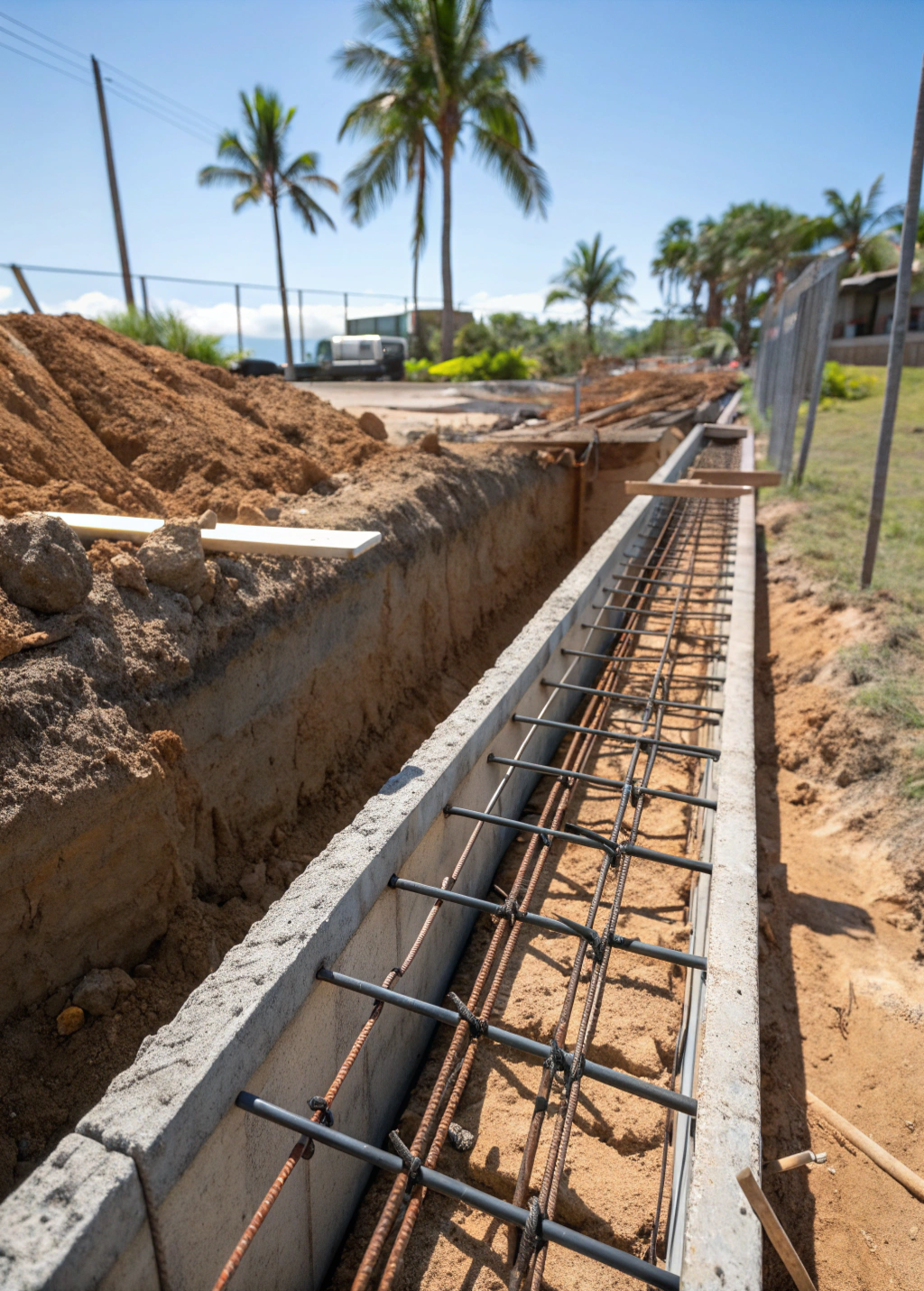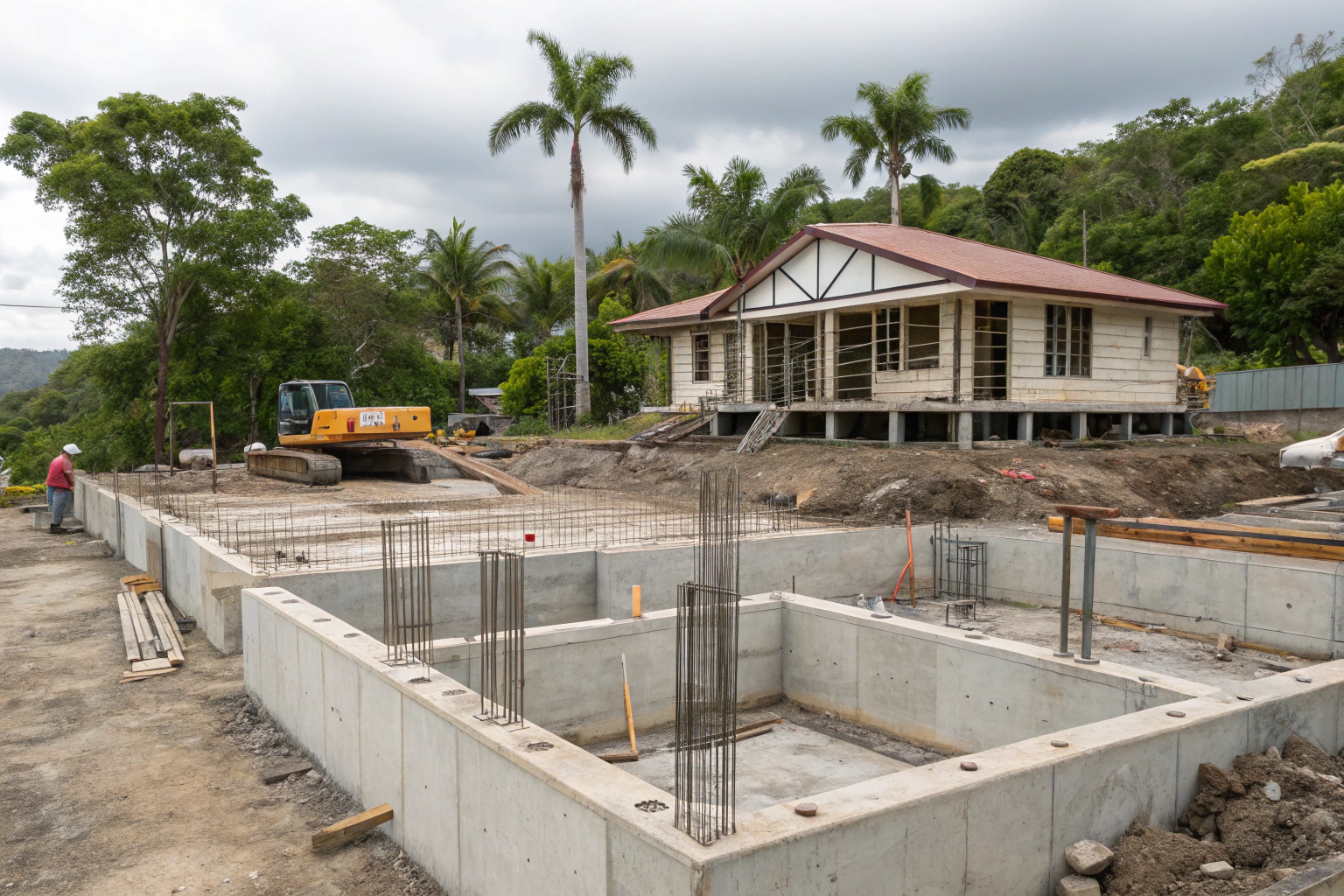
Townsville’s Trusted Concrete Foundation Specialists
Fifteen years of pouring concrete foundations across Townsville gives you insight into what works and what doesn’t. We’ve built in every suburb – from Bushland Beach to Bluewater, Railway Estate to Burdell, and everywhere in between. Each project taught us something about local conditions and refined our understanding of North Queensland construction.
We know Gulliver and Kirwan typically show reactive clays needing Class H designs. Coastal suburbs like Pallarenda and Belgian Gardens require higher cyclone ratings but often have better drainage. Granite-based areas around Castle Hill provide more stable founding conditions. This local knowledge helps with accurate quoting and anticipating challenges before they happen.
We maintain strong relationships with structural engineers and certifiers who work regularly in Townsville. They know our installation standards and trust our work quality, which means smoother approvals and faster turnarounds on your project.
All suburbs serviced – northern beaches, southern suburbs, western growth areas. Our trucks travel anywhere in Greater Townsville with the same quality standards and professional service.

Why Your Foundation Matters
Your foundation carries every single kilogram of your building – walls, roof, everything inside, plus wind loads during cyclones. Get it right and you’ve got a structure that performs reliably for decades. Get it wrong and you’re dealing with cracks, movement, and expensive repairs that only partially fix the underlying problem.
A properly engineered concrete foundation delivers several critical benefits:
- Supports your structure safely through all conditions – distributing loads across soil that expands and contracts with moisture changes while maintaining structural integrity
- Prevents cracking and movement by accommodating normal ground shifts without transferring stress into your walls and finishes. That’s the difference between minor settlement and major structural issues.
- Protects your investment long-term. Foundation repairs cost significantly more than building it right the first time, and they rarely restore full value to your property.
- Meets building code requirements for cyclone zones. Council won’t approve your build without engineered designs, soil reports, and proper inspections – and for good reason

Our Foundation Construction Process
Every concrete foundation we pour in Townsville follows the same proven process – methodical, engineered, and designed to deliver exactly what your building needs. Soil testing and classification come first, where a geotechnical engineer visits your site, takes bore samples, and analyses the soil. You’ll get a report that goes to your structural engineer, who then designs the foundation specifically for your site’s soil class, building design, and Townsville’s cyclone ratings – specifying everything from concrete grade to reinforcement details.
Site preparation and excavation get everything ready. We clear and level the area, excavate for edge beams, compact fill, install drainage, and lay moisture barriers. Formwork goes in accurately and gets braced properly. Then we install reinforcement – placing mesh and bars exactly to engineering specifications. Council inspects the steel before we’re allowed to pour anything.
Concrete pour happens once approved. We place, vibrate, screed, and finish the concrete properly across the entire slab. Curing starts immediately to prevent rapid moisture loss, followed by final council inspection. You receive compliance certificates, engineer certification, concrete test results, and complete documentation for your building file.
Our Quality Assurance Standards
Quality foundations don’t happen by accident. They result from following proven processes, working with qualified professionals, and maintaining high standards throughout construction.
We’re licensed and insured to perform concrete foundation work across Townsville. Our QBCC license and public liability insurance mean proper qualifications, current coverage, and accountability. You’re protected, we’re legitimate, and everything’s above board.
Engineer specifications are followed exactly on every project. If the design calls for N32 concrete, we use N32 – not N25 because it’s cheaper. If reinforcement specs say R12 bars at 300mm centres, that’s exactly what gets installed. We don’t interpret or “improve” engineering – we follow it precisely, because that’s what makes foundations perform as designed.
Council inspections get passed consistently because our work meets code the first time. We know what Townsville City Council inspectors need to see – steel placement, reinforcement cover, formwork accuracy, and concrete quality. Compliance certificates document proper construction and protect your investment.
Frequently Asked Questions
Yes – and the council requires it anyway. Townsville soils range from Class A stable sands to Class H highly reactive clays, sometimes within the same suburb. Your foundation design changes dramatically based on soil classification. Skip testing and you’re either over-engineering (wasting money) or under-engineering (risking structural problems).
A typical residential slab takes 2-3 weeks from site prep to final inspection. That includes excavation and formwork (2-4 days), reinforcement installation (1-2 days), council steel inspection, concrete pour (1 day), curing period (7 days minimum), and final inspection. Weather, site access, and project complexity affect timing. Commercial foundations take longer due to size and engineering complexity.
Class M (moderate reactivity) soils move somewhat with moisture changes. Class H (highly reactive) soils expand and shrink significantly between wet and dry seasons. Class H foundations need deeper edge beams (often 500-600mm versus 300-400mm), heavier reinforcement, and sometimes waffle pod systems to accommodate movement. Class H designs cost 20-40% more than Class M due to additional materials and complexity.
Waffle pods work brilliantly on reactive clay soils. The voids underneath allow ground movement without transferring stress into your slab. They’re lighter, use less concrete, and handle Class H soils better than standard slabs. Downsides? Slightly higher material costs and you can’t drill through the slab easily for plumbing later. For Townsville’s reactive soils, they’re often the smart choice.
Depends on your location. Coastal suburbs typically require C3 rating (designed for winds up to 69m/s). Inland areas generally need C2 rating (up to 56m/s winds). Your engineer designs for the appropriate rating based on your address. The foundation must resist both downward loads and uplift forces during cyclones – that’s why proper hold-down connections and reinforcement matter.
Ready to Build Your Foundation the Right Way?
Your building deserves a foundation engineered specifically for Townsville’s conditions – not a standard design that might work somewhere else. We’ve been pouring concrete foundations across North Queensland for over fifteen years, and we know exactly what it takes to deliver a slab that performs reliably for decades.
Whether you’re planning a new home, commercial building, or extension, we’ll engineer a foundation solution that handles your soil conditions, meets cyclone requirements, and gets council approval the first time.
Contact Platinum Concreting today for a free site assessment and detailed quote. We’ll discuss your project, review any existing plans or soil reports, and provide transparent pricing for engineered concrete foundations built right. No obligation, no pressure – just professional advice from local concrete specialists who understand Townsville.
Call us now or request your free quote online. Let’s start your project on solid ground.



